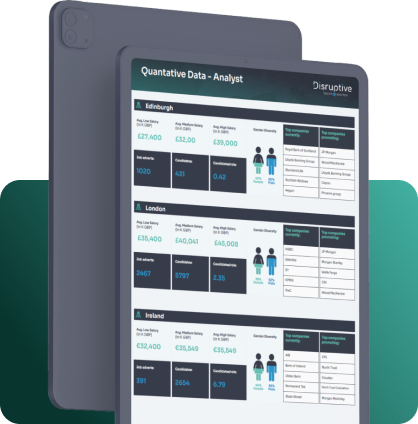Our brand new podcast started with a bang! The Disruptive Mindset Podcast is hosted by Emma Jones CEO at Disruptive Hiring, who takes a deep dive behind the scenes of executives and leaders in the IT and the tech industries. We tap into their models for success, lessons they’ve learned and what makes them disruptive in their businesses and sectors. On our first episode, Emma Jones was joined by a great guy who is a natural leader in his field of expertise, who has a vibrant past, and is now sitting on the board of a leading financial services and digital transformation consulting firm.
Read on for just some of the highlights from our fantastic conversation with John Gaunt!
What was your planned destination when you left school?
I think the reality is I didn’t have a plan. After I left school, I ended up doing three things. I was conscripted so I went to the military. When I got out I hitchhiked around Europe and the United States for a year. Then I went to university. I went to university later than most people would have gone to university but I had these two life experiences that other people didn’t. In terms of a learning experience, I think the most important experience for me was what I would now call a gap year, that year in Europe in the United States. It taught me that I could survive anywhere, which was a very empowering moment in my life, because I learned that I didn’t need anybody else. In the military, having to be disciplined and get up and be shouted at and do all that sort of thing gave me a sense of inner strength. Add to that my academic experience at university, l learned from those three things that I could execute my intellect and ideas in a confident fashion, and I wasn’t going to be bullied or be beholden to anybody because I knew I could survive. I had no plans for my destination, I just got there.
Where did you go from there?
I was offered a position at a mining house to join their leadership development programme. It was right at the height of the apartheid wars, and what was happening was because there was intransigence on a political level, everything was being brought to the workplace. Trade unions were making hyper powerful demands that were almost excessive in terms of what a business should have to bear. You had no option but to deal with these things because there was a logjam at a political level. I found that opportunity to be really motivating, so I joined ran mines at the time. It was really interesting to be part of the South African transition journey and see it from the ground level in that sense. It was a really interesting time to be a very small cog in a very large machine.
When did success start for you, and what did it look like?
Success is getting a job. It’s getting your first paycheck. It’s getting promoted. I think people are often a little unrealistic in their expectations of what success is, they see it as a big thing that you’re always aspiring to, but there is success in every day. I suppose much like coming out of school, I don’t really have a goal. I’m not one of these people that has a five year career plan, I’ve never had that. I think that’s offset against the issue that I’ve understood for my entire working life – I’m going to get nothing for nothing. I am my own career manager. I need to manage myself irrespective of what’s going on in the organisation around me. Having a holistic view of what my career might be without any preconceived ideas of ‘I must be earning x by that age or doing y by age z’ gave me the opportunity to walk through open doors which I might not have seen otherwise.
If you look at any successful person, they never get there on their own, you have to have a support network. What’s your support network like?
My wife is my number one supporter. I’ve always been a relationship person, so I’ve always engaged with people and spoken to people. I’ve embraced maintaining relationships and friendships, wherever they were, before it was cool to do it. Once a week I reach out to 10 people that I hadn’t spoken to that week and just kept that connection alive. It’s amazing how much friendships can impact you. But it’s not all easy and I struggled a little bit as well through these moments. I’m lucky I come from a very multicultural family. My grandparents on my paternal side were Irish and English, then on my mother’s side they’re Italian. I grew up knowing the requirements to respect cultural differences between my mom’s side of her family and my dad’s side of the family. Those skills have helped me a lot.
The part of me that struggled during my career was that I’ve always been quite direct. 20 years ago, 25 years ago, bosses didn’t take well to subordinates telling them in an honest and candid way that they messed up, we didn’t agree with them, etc. I struggled a little bit with relationships with one or two bosses, because I seemed to be a little bit insubordinate, maybe a little bit too direct, that sort of thing. But I learned very quickly that if you speak the truth when you can, even if you get put aside, you gain respect from the individual that you told it to.
Have you got a favourite story that’s happened at work?
I got fired once. I was working for a company in South Africa who had just been through a merger. The chief executive of the company that did the acquisition actually wanted someone to manage their relationships with trade unions, which is where I’ve been and how I’ve grown and said I was technically a good fit for it. This would have been a major step up for me in an industry and the very direct conversation was that we have someone in the union that we pay, and they get us the results that we want. I took on this person who was the chairperson of the Johannesburg Stock Exchange listed company and I told them that what they were doing was unethical, so I was basically escorted off. I was fired the next morning.
We all make mistakes. Yeah, I probably could have been a little more subtle without compromising the watch, but now I’ve got no regrets about getting fired. It affords you the opportunity for reflection. Are you going in the right direction? Was this the right thing for you? Have you become too complacent? Should you do this? Should you do that? You get that old cliche which says, ‘everything’s for a reason’, so maybe this is gonna be the best thing that ever happened to you. The other side of that coin is that people who work with me and work for me love my candour because I never make things personal or argue so they can come and ask me any question. Unless it’s something which is top-secret I’ll just tell them. Actually I’ve had comments about speaking truth as a power from subordinates, and they’ve been some of the most fulfilling moments in my day.
I’m not scared to call bullshit when I see it. The reality is that everybody – me, you, everybody in the world – makes mistakes along the way. Some of us are less good at admitting it and getting out of it and we sometimes need to be told. Don’t be scared to go to, ‘Joe Bloggs, what the hell are you doing?’ As I became more senior, in terms of years and experience, that ability to be candid with Chief execs, directors and other C suite people has been one of the really enriching elements of my life. It allows you to have really meaningful conversations. It’s been really interesting in terms of coaching people in that space.
Have you got a final destination in mind for your career?
I’m gonna continue to walk through doors. I’ve lived an absolutely blessed life with the job that I got. It took me around the world, allowed me to meet remarkable people, and gave my kids my family life experiences which they could never have dreamt of. I’m a very lucky human being and I don’t take that for granted. I think the future has to be that I want to help nurture people to go on the same or similar type journey. Hopefully I can do a little bit of that. An ex-boss of mine, when he decided to retire, said ‘I want to do three things; stay relevant business wise, I want to do some charity work, and I want to teach. He went away, and he became a board member of a tech company and a board member of a fashion retailer. He did that for 10 or 12 years after he retired, then he became the finance director or governor for a global religious group. He became a teacher at his local business school for like 10 or 12 years. He had a really fulfilling life. He earned money. He stayed relevant in what he knew. He gave back to society, and he gave back to people through that. So I think that if I could do half as well as him I would be happy with where I end up.
We hope John’s stories and unconventional ideas of success have inspired you to think differently about your own career path. If you’re looking for your next adventure in the tech industry, reach out to a member of our team today. To listen to the full episode of The Disruptive Mindset Podcast, click here for Spotify or click here for Apple Podcasts.


How Disruptive is your Leadership Hiring?
Find out where your management team’s weaknesses are and how you could improve your hiring strategies with this free 5 minute questionnaire.
Contact Us
"*" indicates required fields
